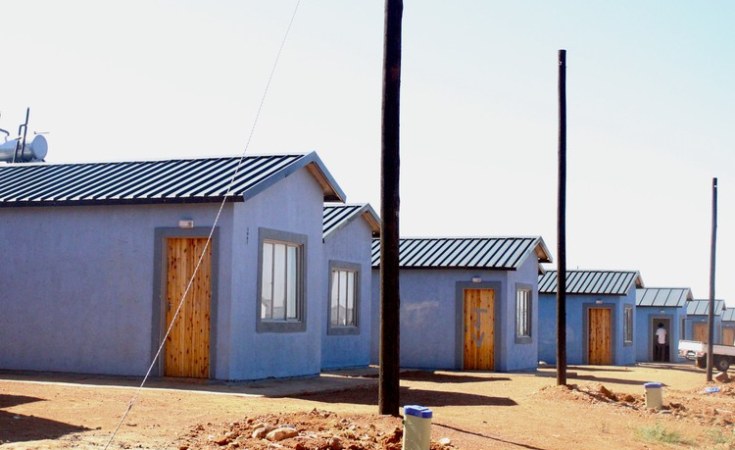The occupation of more than 360 houses was sparked by allegations of corruption at the housing project
- Over 360 almost completed RDP houses in Randfontein have been illegally occupied since August.
- The occupation was sparked by allegations of corruption, racism and a lack of transparency around the housing beneficiary list.
- The ward councillor says the occupation has jeopardised the entire project, meant to deliver over 9,000 houses.
- The occupiers, mostly coloured, say they have never benefitted from any housing project since democracy.
- The Gauteng human settlements department says race plays no role in its housing policy and the allocation process is beyond any manipulation.
Over 360 almost completed RDP houses in Randfontein have been illegally occupied since August.
Most of the houses do not yet have electricity, tap water or sewerage connections. The occupiers say that when "outsiders", including people from Bekkersdal, took possession of seven of the houses, they decided to occupy the development.
"When we saw municipal officials handing out keys from the back of the car for houses that had no water or electricity and to complete strangers, we realised there is a snake in the grass. Things were not being done right," said Bronwyn Gone, a community representative.
Ward 8 councillor Balderic Breyer (DA) said initially 190 houses were to be handed over in August, but the number was later cut down to about 45 houses.
"Without my knowledge or even an invitation, I saw the developer pushing out house keys from the back of his car in a video. One thing led to another. And that got people upset, because we were still waiting for the formal process. I was never invited there and the people were very angry, and then some of the community leadership decided that houses be occupied illegally."
Breyer condemned the occupation. "The illegal invasion has jeopardised the whole project because the first phase was supposed to unlock funding for the other phases to be built, and I doubt that the project will run as smoothly as expected because of the illegal invasion."
"Real beneficiaries who have waited for houses from 1994 have lost out and contractors who were working on the project have lost livelihoods, because the project has now stalled due to invasion."
The occupiers claim there has been a lack of transparency around the beneficiary list for the Toekomsrus Extension 9 project. Rumours had spread that people were paying R5,000 to R7,000 to get houses allocated to them.
The occupiers are mostly coloured families. They say there has been no development for their benefit since 1994, while people in surrounding areas have received title deeds. Some say they have been approved for housing subsidies.
But Tahir Sema, spokesperson of the Gauteng Department of Human Settlements, said most of the occupiers are invaders and only 23 beneficiaries had been officially allocated houses.
"Only hope"
Gone has also occupied one of the houses. He said the project was the only hope for the people of Toekomsrus to get housing. They have named the place Erfsondes.
The land was originally donated by the Sibanye Mine to the municipality. The development is a Western Mega Project under the provincial government and meant to eventually deliver 9,385 "mixed housing units".
Sema said for the 2022/23 financial year 281 of 360 units were 95% complete, but all the units were "invaded in August".
Sema said the majority of officially approved beneficiaries are from Toekomsrus wards 3, 8 and 20, and there were also allocations for people in Dumpsite (ward 8), Randfontein CBD and some from Mohlakeng.
Sema said housing policy does not consider race and approved beneficiaries are sourced from the Housing Subsidy System based on where they reside.
"The system cannot be manipulated and is algorithmic," said Sema.
Sema said the occupation has been referred to the department's legal unit for further processing.
Shortly after the occupation, the Red Ants arrived warning the occupiers to vacate, but they stayed.
Now, three months down the line, the occupiers want their occupation to be given official blessing and to be given services.
Some have fully furnished their homes and established gardens in their yards. They are completing construction at their own expense.
Jeanne Davids says she applied for a house in 1994. She, her husband and eight children were living in a shack before they occupied one of the houses.
"I followed protocol for 20 years but nothing worked and I have now illegally moved into this house due to a lack of choice ... People get houses unlawfully, as long as they have money, while some of us get nothing," she said.
Emily Foster, who lives with a spinal disability, first applied for a house in 1986. She moved from shack to shack before meeting Donald Wilson. Together they applied for a subsidy and received approval for a house for people with disability, she said.
The house they have been allocated has no doors or windows and has not been plastered. Meanwhile they are fixing up the house that they have occupied.
"How can we still continue living with our parents?" asked Chrisel George.
"They have accused us of not wanting other races in the community. It's not true. We want everyone to stay here, as long as our people get houses too."


